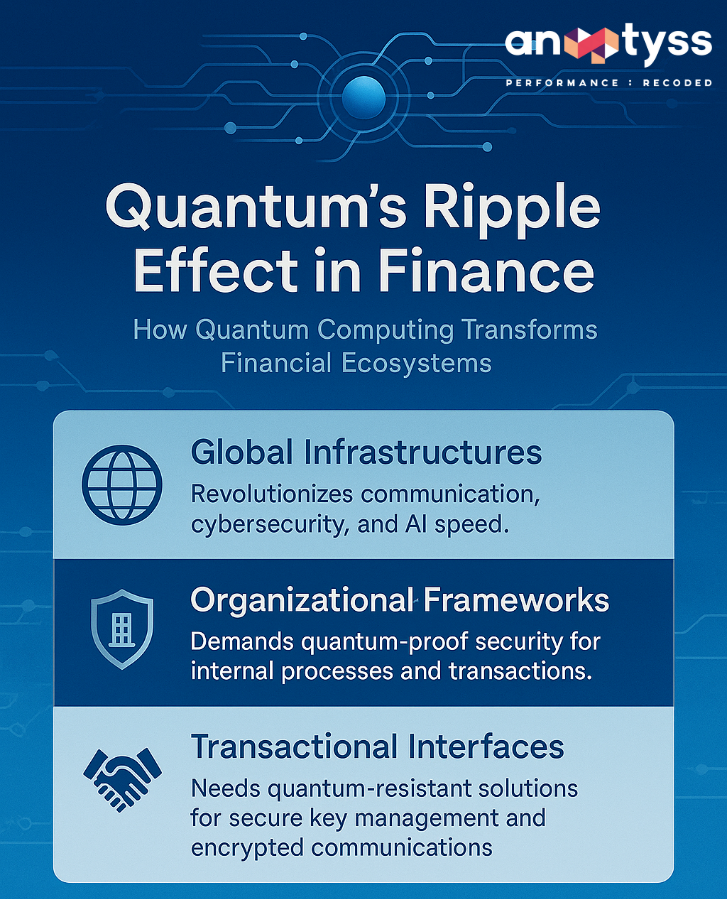This blog provides a comprehensive analysis of how quantum computing is set to redefine the financial services landscape. It examines its potential to enhance portfolio optimization, risk modeling, fraud detection, and cybersecurity. Key quantum principles such as qubits, quantum algorithms, and post-quantum cryptography are explored alongside practical implementations by leading institutions including JPMorgan and Goldman Sachs. The piece also outlines strategic considerations for financial organizations seeking to capitalize on quantum advancements.
Quantum computing is an emerging technology poised to redefine established financial paradigms, impacting everything from intricate risk assessment and optimized portfolio management to enhanced cybersecurity and sophisticated algorithmic trading.
The transition from theoretical concept to tangible application is accelerating, necessitating proactive strategic adjustments within financial institutions.
In this blog, we examine the foundational principles of quantum computing, its transformative implications for core financial operations, emerging real-world applications, and the strategic challenges institutions must address.
Understanding the Quantum Evolution
At its core, quantum computing fundamentally diverges from classical computational models. Instead of relying on binary bits (0s or 1s), quantum computers leverage qubits, which can exist in multiple states simultaneously through superposition. This, coupled with entanglement—a phenomenon where qubits become interconnected regardless of distance—enables quantum machines to execute complex calculations and analyze vast datasets with unparalleled speed and efficiency. This capability allows for the identification of intricate patterns beyond the scope of traditional computing methods, making it exceptionally well-suited for the dynamic and data-intensive financial environment.
A Foundational Shift Across Financial Ecosystems
The influence of quantum computing will extend across the entire financial landscape, manifesting through three distinct interconnected dynamics—

a. Global Infrastructures
At the global level, quantum computing will revolutionize communication infrastructures, cybersecurity protocols, and the velocity of artificial intelligence. This will necessitate the development of entirely new security architectures to manage the exponentially accelerating pace of change.
b. Organizational Frameworks
Individual financial organizations will be compelled to adapt their operational workflows. This requires implementing quantum-proof security measures for all internal processes and cross-organizational transactions, potentially through advanced post-quantum cryptography (PQC) solutions.
c. Transactional Interfaces
The impact will reach individual interactions, demanding quantum-resistant solutions for secure key management and encrypted communications. Financial entities must integrate enhanced security directly into their workflows, assets, liabilities, and transactional frameworks.
Furthermore, quantum computing will significantly accelerate the evolution of AI in finance. This will translate into real-time adjustments of trading strategies, the development of proactive fraud detection mechanisms, and the ability to conduct risk modeling with unprecedented levels of complexity.
Transformative Applications of Quantum Computing in Financial Operations
The strategic adoption of quantum computing offers substantial competitive advantages across various financial operations.
a. Portfolio Optimization
Quantum computers can process the extensive variables involved in investment portfolio optimization at speeds unattainable by classical methods—balancing returns, risk, and regulatory constraints in real time. Institutions like JPMorgan Chase and Fidelity, in collaboration with IonQ, are leveraging quantum algorithms such as the Quantum Approximate Optimization Algorithm (QAOA) to streamline investment strategies.
- JPMorgan Chase moved beyond traditional Monte Carlo simulations, using quantum algorithms to expedite and refine portfolio selection.
- D-Wave’s quantum annealing systems have been employed by startups like Multiverse Computing and Chicago Quantum, delivering faster, higher-quality asset allocation solutions.
- 1QBit has developed quantum-enhanced methods to identify optimal portfolio configurations under diverse market conditions.
These developments enable real-time portfolio rebalancing, a capability increasingly critical in volatile markets.
b. Risk Analysis and Management
Quantum computing improves risk assessment by enabling more precise modeling of market behaviors and scenario simulations.
Quantum Monte Carlo methods can reduce portfolio risk calculation times from hours to seconds. Additionally, quantum AI is projected to decrease loan default rates by 20%-30% through advanced risk modeling. These improvements allow banks to make faster, better-informed lending and investment decisions.
c. Fraud Detection
Quantum machine learning (QML) enhances fraud detection by analyzing vast transactional datasets with superior speed and granularity. For instance, a fintech startup specializing in peer-to-peer (P2P) lending platforms employed Quantum Machine Learning (QML) to monitor transactions for collusion and fraudulent activities among lenders and borrowers. The project utilized quantum neural networks (QNNs), which leveraged the superposition property of quantum systems to analyze transaction networks at an accelerated pace.
This enabled the simultaneous assessment of multiple potential fraud scenarios. As a result, the platform achieved a 25% reduction in false positive rates, significantly improving user experience while preserving trustworthiness. The quantum-enhanced system was seamlessly integrated with existing classical machine learning models, providing a hybrid solution that enhanced both the accuracy and responsiveness of the fraud detection process.
d. Derivatives Pricing
The computation of complex financial derivatives, a highly resource-intensive task, stands to be significantly optimized. Goldman Sachs, in collaboration with QC Ware, estimates that quantum algorithms could accelerate derivatives pricing by up to 1,000x, with quantum algorithms already demonstrating up to 100 times faster computations than traditional models.
e. Operational Optimization
Quantum computing can drive down operational costs and enhance efficiency. A notable collaboration between SpinQ and Huaxia Bank’s LongYingZhiDa Fintech for ATM placement and management optimization yielded a quantum AI model that achieved 99% accuracy, surpassing classical algorithms in both speed and precision.
f. Cybersecurity
The cybersecurity implications of quantum computing are both a risk and an opportunity. As traditional encryption faces obsolescence under quantum attacks, institutions must adopt quantum-secure protocols.
- HSBC, in partnership with Quantum, is exploring quantum-enhanced cryptography to safeguard sensitive financial data.
- Quantum Key Distribution (QKD) enables unbreakable communication channels, resistant even to quantum-level breaches.
- Shor’s algorithm, if implemented on scalable quantum machines, could compromise classical encryption schemes—necessitating a shift to post-quantum cryptography (PQC).
Navigating Challenges and Ethical Considerations
Despite its promising capabilities, the integration of quantum computing presents considerable challenges and ethical considerations:
a. Decryption Risk
A critical concern is the ability of quantum computers to compromise widely adopted encryption protocols, such as RSA and ECC, which form the bedrock of modern cybersecurity.
This vulnerability introduces the threat of “Harvest Now, Decrypt Later” attacks, where sensitive encrypted financial data is captured today for decryption once powerful quantum computers become available.
b. Integration Complexity and Talent Shortage
The integration of this advanced technology into existing, often legacy, financial IT infrastructures represents a substantial hurdle. Compounding this is a notable deficit of skilled professionals in quantum information science, making it challenging for organizations to acquire the necessary expertise.
c. Exacerbated Inequalities
The high cost and inherent complexity of quantum computing resources currently limit their accessibility to a select group of well-funded corporations and governmental entities. This concentration of power carries the risk of exacerbating existing socio-economic inequalities and widening the digital divide.
d. Accountability and Transparency
As quantum algorithms become increasingly sophisticated, particularly in AI-driven decision-making, questions of accountability arise when unforeseen or undesirable outcomes occur. Establishing clear guidelines and robust governance frameworks is paramount to addressing these concerns.
Conclusion
The quantum computing revolution in finance is not a speculative future but an impending reality. The paradigm shift it promises will unlock unprecedented opportunities for efficiency, accuracy, and innovation, while simultaneously introducing significant security challenges. Financial institutions that proactively embrace this transformative technology, strategically invest in quantum-safe solutions like PQC, and cultivate a quantum-ready workforce will be optimally positioned to secure a leading and resilient position within the evolving global financial landscape.
At Anaptyss, we recognize that quantum transformation is not just about adopting new technologies—it’s about preparing your organization to thrive in a fundamentally reshaped digital landscape. Whether you’re exploring quantum use cases, integrating hybrid quantum-classical systems, or transitioning to post-quantum cryptography, we bring the domain expertise and executional agility to guide you every step of the way.
To future-proof your financial operations—connect with us at info@anaptyss.com or visit Anaptyss Digital Services page to learn more.



